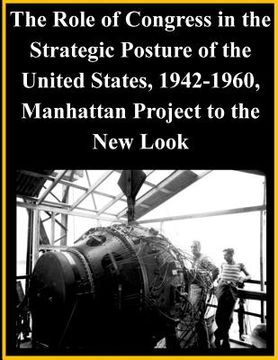The Role of Congress in the Strategic Posture of the United States, 1942-1960, Manhattan Project to the New Look (en Inglés)
Reseña del libro "The Role of Congress in the Strategic Posture of the United States, 1942-1960, Manhattan Project to the New Look (en Inglés)"
This is the fourth in a series of papers to examine the role of Congress in the development of the doctrinal and material strategic posture of the United States. Previous papers examined the role of Congress in building the U.S. strategic posture during the decades of the 1960s, 1970s, and 1980s. This paper examines the role of the 77th-86th Congresses, from 1942 to 1960, an eighteen year period that begins with the development of the first atomic weapons during the Manhattan Project and runs through the administration of President Dwight Eisenhower and the development of the "New Look" nuclear strategy.The role of Congress in the development of the U.S. strategic posture is underappreciated by historians and policymakers. Histories of U.S. nuclear strategy and the weapons programs funded to implement that strategy typically focus on the executive branch, the Department of Defense, the military services, and academic theorists as the prime movers. Indeed, at least one historical treatment describes the role of Congress in the development of the U.S. strategic posture as merely a passive "rubberstamp" for the Department of Defense, not only on matters of doctrine and weapons programs, but even on "oversight responsibilities with regard to the nuclear weapons budget."In fact, Congress played an important, often dominant, role in the development of U.S. doctrine and nuclear forces that are the basis of the strategic posture of the United States. Moreover, the congressional record is a rich resource, not least for being unclassified, that documents the important role of Congress in strategic matters. The congressional record provides often meticulous detail on the debates and thinking of congressional, administration, military service, and academic actors on the evolution of the strategic posture. Yet this resource is underutilized by historians, which may account in part for their underestimation of the importance of the role Congress has in this area. The paper draws heavily from the congressional record, letting the actors speak for themselves as much as possible, to demonstrate the richness of this neglected resource, to encourage further research, and because it is the best way to tell the story.This paper presents a very brief history on the role of Congress in making the U.S. strategic posture during the seminal period 1942-1960, when atomic and nuclear weapons and their delivery systems were new and rapidly evolving technologies. It treats the highlights of this period when the foundations of the U.S. strategic posture were undergoing material and intellectual creation.As Congress and its role in the development of the strategic posture is the subject of this paper, the focus shall be on the Congress, and not on the President, the Department of Defense, the military services, or academic theorists. The roles of these actors are the usual subjects of histories of nuclear strategy and the strategic posture, and have already been exhaustively analyzed elsewhere. Moreover, this is not a history of specific bomber and missile programs. Although Congress certainly influences and often plays a decisive role in such programs, its impact on these programs does not represent the largest contributions Congress makes to the development of the strategic posture.

